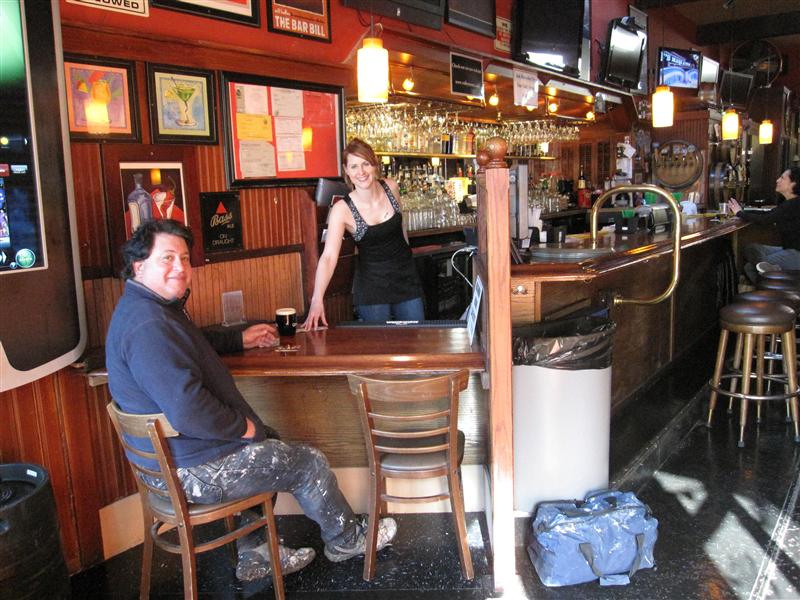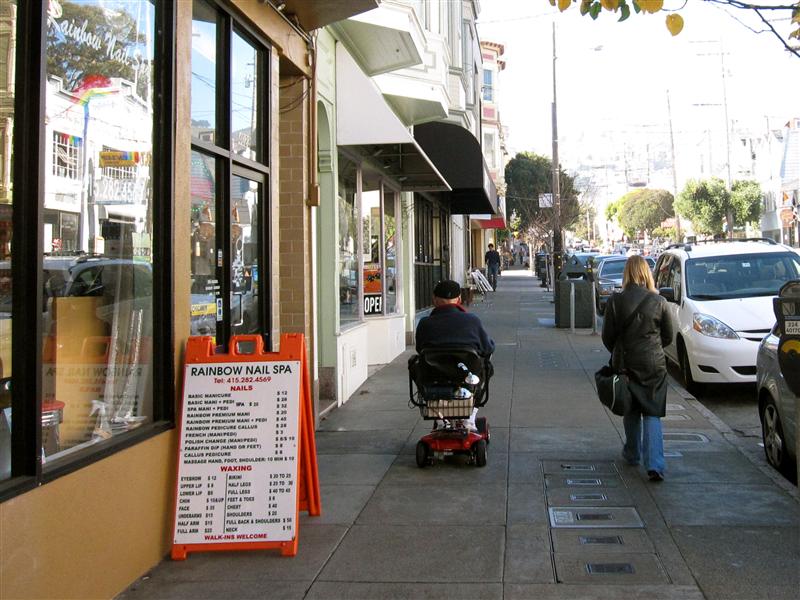
RETURN TO HOME PAGE
FEEDBACK
 |
February 2011 RETURN TO HOME PAGE FEEDBACK |
By Corrie M. Anders

Valley Tavern patron Andrew Valdeolivar and bartender Julie Peyric model a section of the bar recently retrofitted to accommodate customers using wheelchairs. The 24th Street bar was one of seven Noe Valley merchants to receive warning letters from the disability community. Photo by Pamela Gerard Usually, people are pleased with the mail they receive around the holidays. But that wasn’t the case for several Noe Valley merchants, as 2010 drew to a close.
Bill Hoover, co-owner of Gallery of Jewels on 24th Street, got a discomfiting letter a few days before Thanksgiving. The letter-writer, a disabled customer, complained that the entry step to Hoover’s jewelry store made it impossible for someone in a wheelchair to get inside.
Pierre Letheule, the owner of nearby Bliss Bar, received a similar letter in late November. It pointed out that the tavern’s front door—a heavy, wooden frame with an ornate, stained-glass panel—was difficult for a disabled person to open.
By the end of December, seven Noe Valley shop owners—from well-established businesses to new entrepreneurs—had received letters telling them their establishments appeared to violate the federal Americans with Disabilities Act (ADA) and California’s Unruh Civil Rights Act.
The letters were all written by either Craig Yates of San Rafael, Daren Heatherly of Santa Rosa, or Irma Ramirez, also of Santa Rosa. The three are well-known in the disability community. They also have a reputation in business circles: they have filed dozens of ADA-based lawsuits against merchants in San Francisco neighborhoods and across California.
State law provides a plaintiff, in a successful accessibility lawsuit, up to $4,000—and triple that in damages—for each time he or she encounters an illegal barrier at a defendant’s business. There is no limit to the number of times a person can sue an owner or landlord for the same infraction, and federal law leaves the defendant liable for attorneys’ fees.
The Voice was unable to reach the three letter-writers, and their attorney declined to provide contact information, citing privacy concerns.
However, San Rafael–based attorney Thomas Frankovich, who has represented Yates, Heatherly, and Ramirez in many previous cases, defended their motives. He said their interest was not financial gain, but to protect the rights of the disabled.
“None of the clients want a lawsuit” against Noe Valley merchants, Frankovich said. “Even though they’ve been disenfranchised, if the landlord and the tenant promise they will get it [improvements] done and act in good faith, there will not be a lawsuit.”

Wheelchair shoppers are not an uncommon sight along 24th Street. But they often have difficulty patronizing some businesses because of entrance barriers, narrow aisles, or inaccessible bathrooms. Photo by Pamela Gerard
‘Very Stressful’
Still, the letters precipitated a wave of alarm that left local merchants—including many who were not targeted—scrambling to find both quick-fix and long-term solutions.
“It’s been keeping me up at night,” said one shop owner who was told his store did not meet ADA requirements. He preferred not to be identified.
VideoWave co-owner Gwen Sanderson, another merchant who received a letter, fears substantial alterations will cause financial hardship for her small business. A lawsuit, she said, might force her six-year-old operation to close.
“It’s very, very stressful,” she said.
She is busy exploring modifications to her store space on Castro Street.
Noe Valley is just the latest neighborhood to trip over ADA grievances. Regina Dick-Endrizzi, executive director of the city’s small-business office, said some 300 small businesses citywide had been hit with disability lawsuits in the last three to four years.
The Noe Valley Merchants and Professionals Association called an emergency meeting Jan. 5 to hear from Dick-Endrizzi and private ADA consultants. As a preliminary step, the speakers urged shop owners to retain “certified access specialists” to inspect their businesses for possible violations. They also advised merchants to start initiating retrofits.
“The merchants of Noe Valley have an interest to try and solve this problem,” said Robert Roddick, an attorney who is also the association’s president. “We’re not saying it’s unfair.”
Bars Make Fixes
Vince Hogan, owner of the Valley Tavern on 24th near Castro, said he began renovating his popular watering hole within a few weeks of receiving his letter on Dec. 2. In the warning, he was told infractions included a steep entryway, an inaccessible bathroom, and that his bar counter—typical of most saloons—was too high for disabled customers to sit at and “order a drink.”
Hogan said he “dropped a 60-inch section of the bar down to handicapped level” and converted the women’s bathroom, which already was handicapped-accessible, to a unisex bathroom.
He said he’s already spent between $10,000 and $12,000, and planned to continue making other improvements.
Letheule, of Bliss Bar, said he quickly notified his attorney after getting his letter, which was signed by Yates.
“She said she knew about the guy. She said don’t ignore that letter,” Letheule said. “Apologize for the inconvenience and tell him that you will do the necessary work to be handicapped-friendly.”
Not long after, Letheule ordered a $1,600 automatic door opener, which he hopes will make it easier for people to enter the bar.
Ramps Could Work
The letter addressed to Claudia Ricarte, owner of Bubbles and Shampoo on 24th near Vicksburg, said a one-and-a-half-inch doorsill at the store entrance was an impediment for those in wheelchairs. It also suggested that the beauty supply shop obtain a portable ramp to comply with ADA rules.
Ricarte, who opened her boutique 18 months ago, said she planned to purchase the ramp, at a cost of $500 to $600.
A portable ramp also is a potential solution for the tall step impeding access at Gallery of Jewels. Store owner Hoover said the letter he received suggested the shop install a ramp as well as an outside bell and signage that could alert clerks to the presence of a disabled person.
Hoover said it was “the first time in 21 years that I’ve ever had an issue. But I’m sensitive enough that I want to do something about it, and I will do something about it,” he said.
At press time, Video Wave owner Gwen Sanderson notified the Voice that several Noe Valley merchants were working together on accessibility issues. She said businesses who received letters were invited to contact her at Video Wave or write info@noevalleymerchants.com.
City Tries to Help
Many Noe Valley merchants and landlords said they were unaware of the disability access statutes or believed—erroneously—that they were in compliance because the city had approved their building permits and licenses to open.
Others said they were confused because of ambiguity and inconsistencies in the 1990 Americans with Disabilities law and the 2002 ADA amendment to California’s Unruh Civil Rights Act.
Last month, city officials announced several efforts to make small businesses aware of the accessibility requirements, and launched a $1 million loan program to make renovation funds available to small businesses.
Supervisor Carmen Chu said the city plans to start the education process in February by mailing notices to San Francisco’s estimated 3,500 restaurants about their disability access obligations. The mailings may be expanded to other businesses.
The city also is working with the Opportunity Fund, a San Jose–based micro lender, to provide loans of up to $50,000 to help small businesses renovate their properties to achieve ADA compliance, according to Regina Dick-Endrizzi, executive director of the city’s Office of Small Business.
Dick-Endrizzi urged merchants to obtain an ADA inspection to determine whether their business is in compliance and to chart a course for remedial action. Architects and contractors who are licensed as Certified Access Specialists (CASp’s) perform the inspections, which are much like a home inspection.
In addition, Dick-Endrizzi said such an inspection provides a 90-day stay, which will halt any court proceedings, and allows time for a business to initiate a good faith effort to make improvements.
A number of Noe Valley merchants already have retained specialists. Among them were Arnie Lerner of Lerner + Associates Architects and Bassam Altwal of Cal Accessibility, who spoke at the Noe Valley Merchants Association’s Jan. 5 meeting.
Altwal said most businesses would qualify for federal tax credits of $5,000 to $15,000 for an ADA-related issue. Credits are a dollar-for-dollar reduction in the amount of taxes owed.
“In two or three years, you can get your stuff done and be done with it—spending zero money and avoiding the lawsuit,” Altwal said.
—Corrie M. Anders